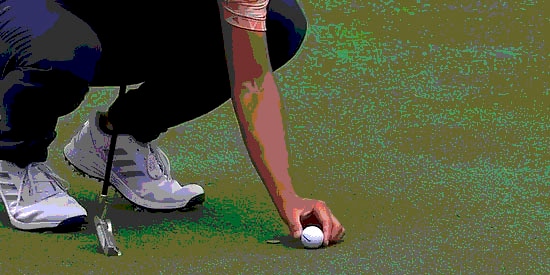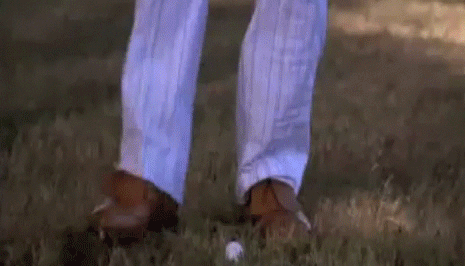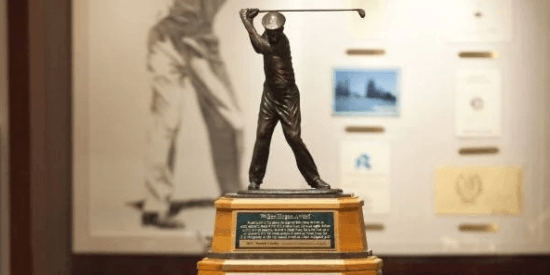Cheating in amateur golf? You might be surprised what players had to say
June 26, 2023 | by AmateurGolf.com Staff

"Cheaters are very good at it", but on the other hand "everybody knows who they are"
At a major senior amateur golf tournament played within the last year, the tournament committee removed a highly-ranked player from the field while the tournament was still in progress. His offense? He was accused of cheating by his fellow competitors.
The player in question had been accused of cheating before, and tournament committees had apparently become aware of it. At the time of his removal from the field, the player was inside the top 10 on the leaderboard and had an outside chance of winning.
One of the more discouraging findings in our Ranked Players Survey series of articles was that 15% of respondents said that they had caught someone cheating in competition.
One player even claimed that there have been "many" incidents of cheating in the tournaments he competes in.
Related: Ranked Player Survey: these are the WORST playing partners in amateur golf
So what constitutes cheating and what behavior did these highly-ranked amateur golfers see?
Usually it is improving one's lie, moving the ball closer to the hole after marking on the green, or stealthily dropping a ball during a search and claiming it is the original ball. But it could also be reporting a score lower than actually shot, falsifying a handicap in a net competition, and even adjusting a score after the round if the tournament is using electronic scoring and time elapses between the group attesting to the scores and when the scorecard is marked as "checked" and electronic scoring is disabled.
"Cheaters are very good at it," said one highly-ranked senior, who like all survey respondents was granted anonymity to speak freely. "They're very hard to catch in the act." But on the other hand, "everybody (players and golf associations) knows who they are", and tournament committees will sometimes take the extraordinary step of asking players to watch other players who might have developed the reputation of being cavalier with the rules.
The stigma of being labeled a cheater
 Can there be a greater dishonor in golf than to be called a cheater? Sure, there are plenty of players you wouldn't want to be paired with -- the slow player, the hot-tempered guy, the arrogant guy, the a**hole -- but only the cheater affects the integrity of the entire competition by playing under conditions that benefit only that player at the expense of everyone else in the field.
Can there be a greater dishonor in golf than to be called a cheater? Sure, there are plenty of players you wouldn't want to be paired with -- the slow player, the hot-tempered guy, the arrogant guy, the a**hole -- but only the cheater affects the integrity of the entire competition by playing under conditions that benefit only that player at the expense of everyone else in the field.
No wonder then, that players react so strongly to incidents of alleged cheating, both the accusers trying to "protect the field" but also those accused, fearful of the label sticking. From the survey:
"A player blatantly cheated 3 times in a single round and when approached about it became extremely confrontational. He was much larger than me and got in my face, very aggressively."
Players have been known to quit competing altogether once the cheating label begins to stick.
The burden of "protecting the field"
The problem with playing with someone with a cheater's reputation is that it can create an extra burden: feeling the responsibility to watch the player and catch him/her in the act, especially if the tournament committee or fellow players ask him to do so. Again, from the survey:
"Paired with a known cheater in a tournament. I vowed to not let him cheat so I watched him like a hawk all day. It was exhausting."
"Player constantly moving his ball and teeing it up in the rough. It is well known he does it. The truth of the matter is I didn’t call him on it. I know that wasn’t the right thing to do because you are supposed to protect the field. The end result is it affected my game a great deal because it took away my own concentration. I still regret not calling the penalty on him."
High-level competitive golf is hard enough without taking on the extra responsibility of monitoring another player's actions.
So why do golfers cheat and what should we do about it?
Many articles have been written about why people cheat, and the possible explanations are numerous: to satisfy the ego by succeeding, to protect it by avoiding failure, the false idea that others are doing it too, or even the belief that it is justified or not really cheating at all.
But the most common explanation is that cheaters are simply trying to do anything they can to reap the benefits of high achievement -- trophies, money, attention, accolades -- which in turn helps cement their self-image of a highly successful person.
"Most cheaters are highly competitive people with narcissistic ego structures. They're driven to maintain an image of power and control at all costs," says Tobias Schreiber, a retired professional therapist from the South Carolina Department of Mental Health. "At heart, they suffer from an underlying sense of inadequacy."
Of course, the reason golfers cheat is of far less interest than what we should do about it, and golfers in our Ranked Player Survey reported a real dilemma over what to do when they suspect someone with whom they are playing has cheated.
The urge to just "let it slide" is understandable in one sense. Golfers generally do not want the distraction or discomfort of having to confront someone, especially if they think it would negatively affect their own game.
The three choices seem to be: (i) do nothing, (ii) alert a rules official during or after the round, or (iii) confront the player. The answer will probably depend on the golfer's personality, his/her tolerance for conflict, and maybe even how well or poorly he/she is playing. But the need to "protect the field" is a real thing, and unfortunately, the right thing to do can often be the most uncomfortable.
Does amateur golf have a cheating problem?
Different players will have different answers to this, but (thankfully) the overall incidence of cheating incidents seems to be low. Still, it's not zero...
So the final word goes to the cheaters, and the message we received seems to be this: players know who you are, committees know who you are, golf associations know who you are, and past experience shows that it's just a matter of time before you're caught.
Be sure to revisit AmateurGolf.com as we continue our Ranked Player Survey series, sharing the expertise and experience of our group of ranked player survey respondents.
The player in question had been accused of cheating before, and tournament committees had apparently become aware of it. At the time of his removal from the field, the player was inside the top 10 on the leaderboard and had an outside chance of winning.
One player even claimed that there have been "many" incidents of cheating in the tournaments he competes in.
Related: Ranked Player Survey: these are the WORST playing partners in amateur golf
So what constitutes cheating and what behavior did these highly-ranked amateur golfers see?
Usually it is improving one's lie, moving the ball closer to the hole after marking on the green, or stealthily dropping a ball during a search and claiming it is the original ball. But it could also be reporting a score lower than actually shot, falsifying a handicap in a net competition, and even adjusting a score after the round if the tournament is using electronic scoring and time elapses between the group attesting to the scores and when the scorecard is marked as "checked" and electronic scoring is disabled.
"Cheaters are very good at it," said one highly-ranked senior, who like all survey respondents was granted anonymity to speak freely. "They're very hard to catch in the act." But on the other hand, "everybody (players and golf associations) knows who they are", and tournament committees will sometimes take the extraordinary step of asking players to watch other players who might have developed the reputation of being cavalier with the rules.
The stigma of being labeled a cheater

No wonder then, that players react so strongly to incidents of alleged cheating, both the accusers trying to "protect the field" but also those accused, fearful of the label sticking. From the survey:
"A player blatantly cheated 3 times in a single round and when approached about it became extremely confrontational. He was much larger than me and got in my face, very aggressively."
Players have been known to quit competing altogether once the cheating label begins to stick.
The burden of "protecting the field"
The problem with playing with someone with a cheater's reputation is that it can create an extra burden: feeling the responsibility to watch the player and catch him/her in the act, especially if the tournament committee or fellow players ask him to do so. Again, from the survey:
"Paired with a known cheater in a tournament. I vowed to not let him cheat so I watched him like a hawk all day. It was exhausting."
"Player constantly moving his ball and teeing it up in the rough. It is well known he does it. The truth of the matter is I didn’t call him on it. I know that wasn’t the right thing to do because you are supposed to protect the field. The end result is it affected my game a great deal because it took away my own concentration. I still regret not calling the penalty on him."
High-level competitive golf is hard enough without taking on the extra responsibility of monitoring another player's actions.
Many articles have been written about why people cheat, and the possible explanations are numerous: to satisfy the ego by succeeding, to protect it by avoiding failure, the false idea that others are doing it too, or even the belief that it is justified or not really cheating at all.
But the most common explanation is that cheaters are simply trying to do anything they can to reap the benefits of high achievement -- trophies, money, attention, accolades -- which in turn helps cement their self-image of a highly successful person.
"Most cheaters are highly competitive people with narcissistic ego structures. They're driven to maintain an image of power and control at all costs," says Tobias Schreiber, a retired professional therapist from the South Carolina Department of Mental Health. "At heart, they suffer from an underlying sense of inadequacy."
Of course, the reason golfers cheat is of far less interest than what we should do about it, and golfers in our Ranked Player Survey reported a real dilemma over what to do when they suspect someone with whom they are playing has cheated.
The urge to just "let it slide" is understandable in one sense. Golfers generally do not want the distraction or discomfort of having to confront someone, especially if they think it would negatively affect their own game.
The three choices seem to be: (i) do nothing, (ii) alert a rules official during or after the round, or (iii) confront the player. The answer will probably depend on the golfer's personality, his/her tolerance for conflict, and maybe even how well or poorly he/she is playing. But the need to "protect the field" is a real thing, and unfortunately, the right thing to do can often be the most uncomfortable.
Does amateur golf have a cheating problem?
Different players will have different answers to this, but (thankfully) the overall incidence of cheating incidents seems to be low. Still, it's not zero...
So the final word goes to the cheaters, and the message we received seems to be this: players know who you are, committees know who you are, golf associations know who you are, and past experience shows that it's just a matter of time before you're caught.
Be sure to revisit AmateurGolf.com as we continue our Ranked Player Survey series, sharing the expertise and experience of our group of ranked player survey respondents.
Most Popular Articles

LIVE SCORING: 2026 Australian Men’s Amateur Championship
Feb 5, 2026Australia’s national amateur championship returns Feb. 3–6 at The Western Australian and Wanneroo.
2026 Ben Hogan Award Watch List: 35 Names to Know This Spring
Jan 29, 2026The 2026 Ben Hogan Award watch list is out—35 college golf standouts are in the early mix for the game’s top individual honor.
Titleist Fitting Philosophy: The Competitive Amateur’s Fastest Path to Lower Scores
Jan 26, 2026Competitive golf is a game of small edges. Titleist’s fitting approach combines expert human insight and honest data
NCAA Champion Michael La Sasso Turns Pro, Signs With LIV Golf
Jan 20, 2026Michael La Sasso is going LIV, joining Phil Mickelson’s HyFlyers GC and passing on the 2026 Masters.
Early Invites Announced for the 2026 Augusta National Women’s Amateur
Jan 24, 2026A running list of the first confirmed names headed to Augusta.Loading latest news...
